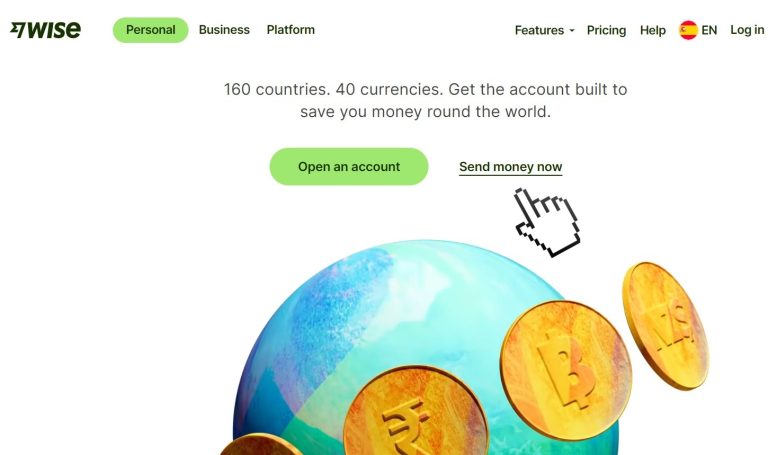banking in spain
Major credit and debit cards (VISA, MasterCard, etc.) are accepted almost everywhere in Europe, including in small towns, and generally provide the best exchange rates, although they usually charge a commission fee if you wish to withdraw cash while abroad.
You may feel more comfortable bringing some euros with you, in which case you should contact your bank in the U.S. to ask about getting euros prior to your departure. However, this is not strictly necessary and we do not recommend bringing more than 100€ to minimize the risk of pick-pocketing.
ACCESSING U.S. FUNDS
Many grantees suggest the best way to transfer funds from your U.S. account to your account in Spain is by using Wise (formerly TransferWise) to transfer money between the U.S. and Spain due to low fees, good exchange rates, and user friendliness.

SPANISH BANKS & OPening a spanish bank account
Standard banking hours in Spain are from Monday to Friday and from 8:00 or 8:30 to 14:00 or 14:30 ONLY. Some branches are open on Thursday afternoons, but this is more common in larger cities. Spanish banks issue debit cards with checking accounts, while credit cards are usually not offered, and will likely not be necessary for you. Most people in Spain use only their debit card.
Even if you have web services, it is still recommended that you open your account at a branch close to your home or, even better, your Host Institution, in case you need to complete any transactions in person.
Please note that the Commission does not endorse any specific banking institution, and any of the major Spanish banks are fine. Grantees under 30 years – or under 35 for some banks – should ask about a cuenta joven, or youth account, as these tend to be 100% commission-free. Former grantees report good experiences banking with Abanca (mostly present in Galicia), La Caixa, BBVA, Santander, and Banco Sabadell. Several grantees recommended the online bank N26 as a convenient way to open a Spanish bank account (it will have a Spanish IBAN) by using your NIE (número de identitdad del extranjero), especially if you are having difficulty opening a Spanish bank account in person. If you do choose to bank with N26, be aware that there are no brick-and-mortar N26 banks, so it will be only be possible resolve any issues with your account online.
Another point to note is that when you open a bank account in Spain you will likely be asked to fill out a W9 form. The U.S. government requires American clients opening accounts abroad to fill out this form as part of the Foreign Account Tax Compliance Act (FATCA). FATCA is an initiative of the U.S. government to fight tax fraud from offshore accounts and the W9 form is how your bank in Spain will notify the IRS of your holdings abroad. Filling out this form is perfectly normal and you will simply have to remember to declare whatever funds you have in your Spanish bank account when you file your taxes.
WARNING: Increasingly, some branches have been implying that some form of health or dental insurance must be purchased in order to open a bank account. This is false and the Commission does not recommend it. If you do not wish to purchase such insurance and they will not back down, simply go to another bank or branch.
Go to the section specifying your grant length below for more information:
Grantees Spending OVER 180 days in Spain:

All grantees who will be in Spain for more than six months – this includes Teaching Assistants, Master’s Candidates, Predoctoral Researchers, and Postdoctoral Researchers – must open a bank account in Spain to receive their grant payments. (In rare cases a Senior Scholar might also be spending more than 6 months in Spain.) It is advisable to open an account right away, even if you have to give a temporary address (such as the Commission’s or your Host Institution’s). Waiting for a permanent address may hold up the process of an apartment contract/lease, and you will likely want access to your first stipend payment as soon as possible for the fianza (security deposit) and to cover the first settling-in costs. Keep in mind that it may take several business days for your account to be ready to use and it may take a week or two to receive your debit card.
Technically, until you have your Tarjeta de Identidad de Extranjero (TIE, or residency card), you can only open a non-resident account (cuenta de no residente). However, most bank agencies will allow you to open an account for residents without the Tarjeta because, in most cases, you already have your Número de Identidad de Extranjero (NIE) on your visa (if you do not have a NIE on your visa, reach out to your main contact at the Commission). To open an account, all you need to take with you to a bank is your passport with your visa affixed to it and your Grant Authorization (this document will prove that you will be regularly receiving payments).
Please note that you must return to your bank as soon as you have your physical TIE card so that they have a copy on file; otherwise, your account could be blocked, and sometimes accounts are blocked without prior notice.
If you do open a non-resident account, make sure that your bank offers you the possibility of changing the non-resident account to one for residents – not all Spanish banks do. Once you receive your residency permit, ask your bank to change your account to one for residents, which carry lower fees and usually offer more services.
Remember to upload your correct Spanish IBAN to the fulbright.es Portal as soon as you have opened your bank account. The sooner you do so, the sooner your Main Contact at the Commission will be able to coordinate with the Finance Department for you to receive your first stipend payment. Inputting the digits of your account incorrectly or out of order will result in a significant delay in receiving your first payment.
We wanted to share an interesting new resource made available to Fulbright grantees by Santander Bank. If you are interested in opening a bank account with Santander Bank, it will be possible for you to complete this process online before your arrival in Spain.
If you would like to open a bank account with Santander prior to your arrival in Spain, please send the attached for and the required documentation in an email with Subject: ¨Fulbright¨to 0321@gruposantander.es. You will be responsible for updating the bank with your Spanish phone number and address once you get to Spain.
Scholars Spending UP TO 180 Days in Spain
Senior Scholars traditionally spend less than 6 months in Spain (though there are a few specific exceptions), and are therefore not required to open a Spanish bank account, though this is still recommended. In some cities it can be difficult to open a non-resident bank account, which is why the Commission is able to issue grant stipend payments to Senior Scholars’ U.S. bank account. Your main contact at the Commission will be in touch with you shortly after your arrival in Spain to confirm your preference, and you may reach out to your Main Contact at the Commission if you have any questions.
Scholars who travel to Spain on visas for up to 180 days (under 6 months) will not be applying for a residency card (TIE) – your visa will be valid for the duration of your stay – and so would need to open a Spanish bank account as a non-resident. To open an account, all you need to take with you to a bank is your passport with your visa affixed to it and your Grant Authorization. Banks increasingly have accounts for non-residents that are sin comisiones (without fees), so you should be sure to ask about these.